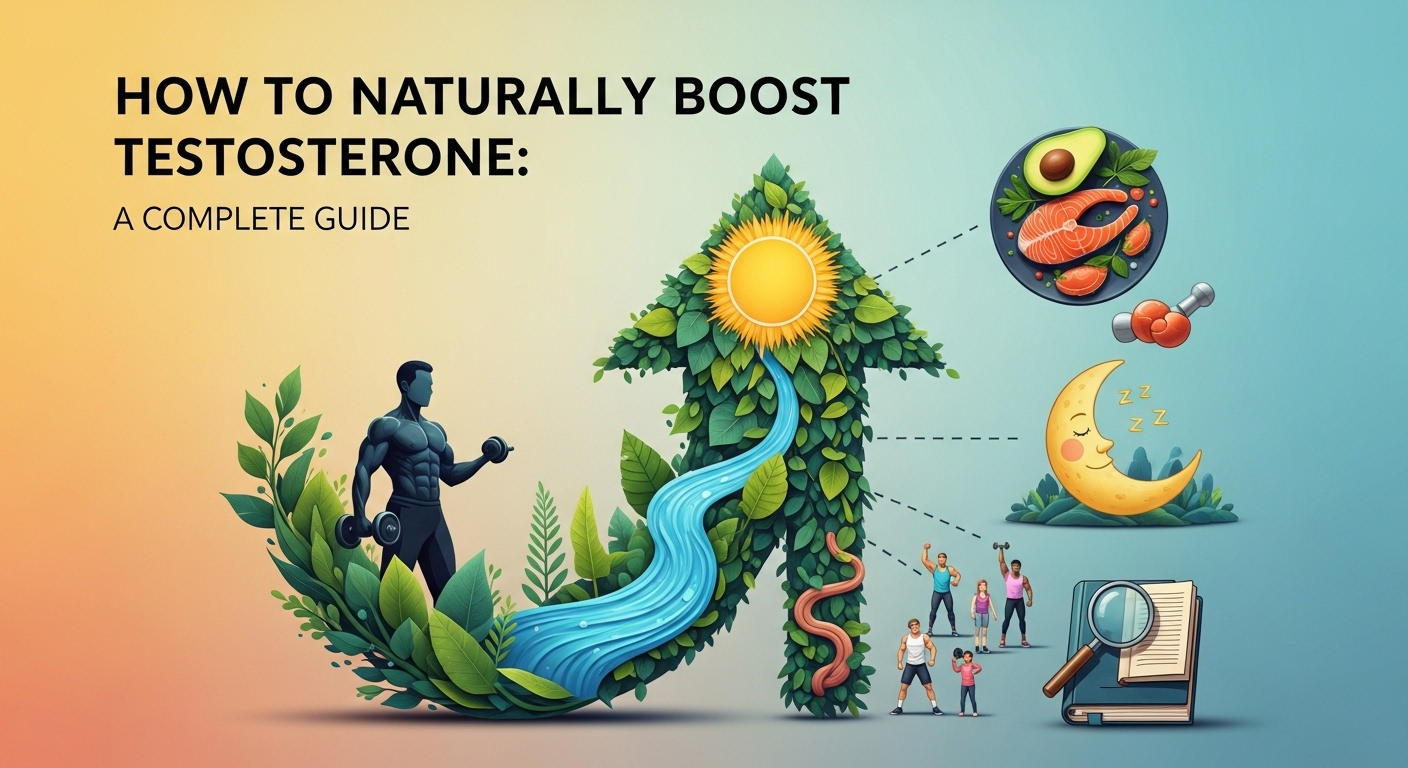Testosterone is often hailed as the quintessential male hormone, but its importance extends far beyond muscle mass and libido. It's a critical hormone for both men and women, influencing energy levels, mood, bone density, and overall vitality. As we age, a natural decline in testosterone is expected, but modern lifestyles—filled with stress, poor dietary habits, and inactivity—can accelerate this process significantly. The good news is that you don't have to resort to drastic measures immediately. If you're wondering how to naturally boost testosterone levels, you've come to the right place. This complete guide will walk you through science-backed, sustainable strategies to optimize your hormonal health from the ground up, focusing on a holistic approach that builds lasting well-being. Understanding Testosterone: More Than Just a "Male" Hormone Before diving into the "how," it's crucial to understand the "what" and "why." Testosterone is the primary male sex hormone and an anabolic steroid. In men, it's produced mainly in the testes, while in women, the ovaries produce it in much smaller amounts. Its production is meticulously regulated by the brain through a system known as the hypothalamic-pituitary-gonadal (HPG) axis. The brain signals the pituitary gland, which in turn signals the testes to produce testosterone. This intricate feedback loop ensures your body has the right amount for its various functions. This hormone is responsible for the development of male primary and secondary sexual characteristics, such as the deepening of the voice and the growth of facial hair during puberty. However, its role is far more extensive throughout life. It is vital for maintaining muscle mass and strength, promoting bone density, regulating fat distribution, producing red blood cells, and driving your libido (sex drive). Furthermore, it plays a significant role in mood regulation, cognitive function, and overall energy levels. Low levels can lead to a cascade of undesirable symptoms, making optimization a key aspect of health. Recognizing the signs of low testosterone is the first step toward taking action. Common symptoms include chronic fatigue, reduced sex drive, difficulty achieving or maintaining erections, loss of muscle mass, increased body fat (especially around the midsection), mood swings, irritability, and even "brain fog." While these can be attributed to other conditions, a persistent combination often points toward hormonal imbalance. It's a misconception that this is only an "old man's problem"; men in their 30s and even 20s can experience clinically low testosterone due to lifestyle factors, making this guide relevant for all adult age groups. The Cornerstone: Diet and Nutrition for Hormonal Health Your body is a sophisticated factory, and the hormones it produces are built from the raw materials you provide through your diet. You simply cannot build optimal hormonal health on a foundation of poor nutrition. The macronutrients—protein, fats, and carbohydrates—all play a critical role. For decades, fat was demonized, leading to a surge in low-fat products. However, this was a grave mistake for hormonal health. Dietary fat, especially saturated and monounsaturated fats, is a direct precursor to steroid hormones like testosterone, as cholesterol is the foundational molecule from which they are synthesized. A well-structured diet for hormonal optimization is not about extreme restriction but about intelligent inclusion. It means focusing on whole, unprocessed foods that are rich in the micronutrients essential for the testosterone production pathway. This involves ensuring you have adequate protein to support muscle mass (which itself supports healthy T-levels), complex carbohydrates to fuel your workouts and prevent a catabolic state, and plenty of healthy fats to provide the building blocks for hormone synthesis. Avoiding chronic, severe calorie deficits is also essential, as the body interprets starvation as a major stressor, shutting down non-essential functions like reproduction and robust hormone production. The quality of your calories matters just as much as the quantity. A diet high in processed foods, refined sugars, and unhealthy trans fats creates a pro-inflammatory environment in the body. This systemic inflammation and associated insulin resistance are directly linked to lower testosterone levels. Therefore, the first and most impactful step you can take is to clean up your plate. Think of food not just as fuel for energy, but as information that tells your genes and hormones how to behave. Key Nutrients That Fuel Testosterone Production Certain vitamins and minerals act as crucial co-factors in the testosterone production process. Two of the most heavily researched and important are Zinc and Vitamin D. Zinc is an essential mineral that plays a pivotal role in modulating serum testosterone levels. Studies have shown that zinc restriction can lead to a significant drop in testosterone, while supplementation in zinc-deficient men can bring levels back to normal. Zinc is involved in the enzymatic processes within the testes and also helps in the conversion of androstenedione to testosterone. Excellent dietary sources include oysters (the most potent source), red meat, poultry, beans, and pumpkin seeds. Vitamin D, often called the "sunshine vitamin," functions more like a steroid hormone in the body than a typical vitamin. Its receptors are found in tissues throughout the body, including the testes. Research published in the journal Hormone and Metabolic Research found that overweight men who were given Vitamin D supplements for a year saw a significant increase in their total and free testosterone levels. The most natural and effective way to get Vitamin D is through sensible sun exposure. However, for those living in northern latitudes or with darker skin, supplementation is often necessary. Fatty fish like salmon and mackerel, as well as fortified milk and cereals, are also good dietary sources. Foods to Embrace and Foods to Limit To build a testosterone-friendly diet, focus on incorporating a variety of nutrient-dense foods. Eggs are a hormonal superfood; the yolk is rich in cholesterol, the precursor to testosterone, as well as Vitamin D. Leafy green vegetables like spinach and kale are packed with magnesium, another mineral linked to increased free and total testosterone levels. Fatty fish like salmon and tuna are excellent for their Omega-3 fatty acids, which reduce inflammation, and their Vitamin D content. Onions and garlic, staples in many





